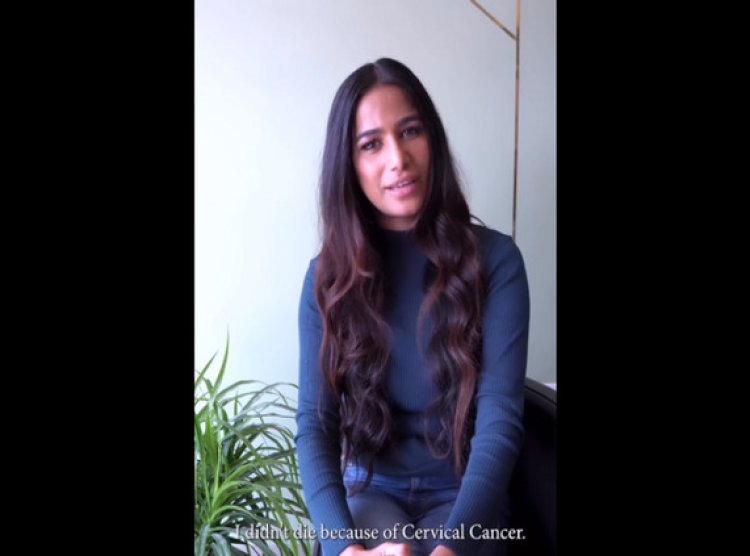In an era dominated by social media influencers, a recent incident involving Poonam Pandey has ignited critical questions about the boundaries of celebrity culture and the ethics of building sensationalist awareness on digital platforms. January, celebrated as Cervical Cancer Awareness Month, and World Cancer Day on February 4 provided the backdrop for the incident. The Interim Union Budget on February 1 also declared the government's plans to advocate for preventive vaccination against cervical cancer for girls aged 9 to 14.
On February 2, Pandey's Instagram page announced her supposed demise due to cervical cancer. However, a day later, she released a video revealing the staged nature of the announcement. It was later disclosed that Hauterrfly, a media publication for women, had orchestrated the event as part of a campaign to shed light on HPV vaccines for cervical cancer awareness. The campaign was conceptualized by Schbang, as confirmed by Pandey in her posts, where she claimed the intention was to raise awareness without hurting anyone's sentiments.
This incident prompted a reflection on the ethical implications of such a dramatic approach, particularly for audiences who have experienced the pain of cancer with their loved ones. The campaign aimed to raise awareness about cervical cancer but faced backlash for its sensational and potentially insensitive execution.
Expert Opinions:
Shavon Barua (Brand Consultant and Strategy Advisor): Sensationalism, shocking or seedy? Many apologies to Oscar Wilde but is it better to be talked about in this ridiculous manner than not being talked about? Truth be told, who is Poonam Pandey who replaced the equally, if not, sillier boy on the search bars for most folks? 3 seconds of fame ticked. Sensationalism ticked, strong reactions mostly anger and distaste for both Pandey, whoever she is and the publication whatever it is, also ticked. The fact they chose a serious subject like Cancer is a new level of low. But what is the surprise? Fake news is a way of life. Almost all versions of Media propagate that and if we have expectations that platforms like the Big Three will call this out, we are even bigger fools. The only hope is this so-called ‘influencer ecosystem’ is soon reaching its expiry date and Brands will stop encouraging and pausing their support to these worthless opinion makers. They are beyond annoying. Anyway, enough time was wasted on this.
Shikha Davessar (EVP and Head Client Business, 22feet Tribal Worldwide): This act is indeed very distasteful, especially considering the growing trend of consumers relying on celebrities and influencers for authentic content. Using shock tactics related to death is not only ineffective but also exploitative. There were certainly better ways to raise awareness about cervical cancer. Poonam is most likely to lose credibility in the future because of this act. Policies are being developed to streamline the content creation ecosystem and prevent misleading content and I genuinely look forward to how it's implemented across the industry. While the initial strategy of this campaign may have met the objective of spreading awareness on the first day, the focus quickly shifted to the influencer on the second day, detracting attention from the actual cause of cervical cancer. The implications of this stunt have been harmful, negatively impacting families who have lost loved ones to the disease. As humans, we should develop empathy and sensitivity for those affected, including families, doctors, and researchers. This act fundamentally undermined the intended purpose at multiple levels. As advertisers, there's a huge responsibility we carry on our shoulders to create authentic stories and narratives that contribute positively to society. We wield the power of persuasion and are capable of influencing mindsets to drive behavioural change. Therefore, we must exercise utmost responsibility in guiding this impact and the change we bring about.
Krishna Iyer (Director - Marketing, MullenLowe Lintas Group): How bizarre was it! Kendall Jenner was seen offering peace at a protest with a can of soda. Or how LinkedIn saw a drama that played out when employees of a job search site began resigning en masse only to join the same company with a refreshed brand name! Or the more recent stunt where a radio station’s CEO publicly announced that it was shutting down only to return with a refreshed brand name hours later. However, Poonam Pandey's death hoax is no laughing matter. Death by cervical cancer" stunt might win the effectiveness award for most likes or shares. Sure, grabbing eyeballs is social media – full marks for that. But "shockvertising" for all the wrong reasons which exploits real-life tragedies and propagates misinformation. It questions the celeb’s status, credibility and authenticity of what is said going forward. Here's the truth: cervical cancer is a serious issue, not a publicity stunt. And while raising awareness is crucial, it shouldn't come at the cost of exploiting grief and spreading harmful narratives. Well-being is not about "pushing boundaries" or "sparking conversations," it's about basic human decency and respecting the lived experiences of countless families touched by cervical cancer. So, Ms. Pandey, your "brave" act wasn't brave. You didn't raise awareness, you just raised hackles. And for brands contemplating similar "bold" tactics, remember shock value might get you clicks, but trust takes a lifetime to build, and one insensitive stunt can shatter it faster than you can imagine. As much as we put the responsibility on celebs, the followers and social media platforms carry this on their shoulders. A verified blue tick of authenticity that was a platform privilege is now available for a monthly fee whether you have a few or a million followers. Platforms, brands and causes such as this have their self-regulation bit to be done. However, the power to make or break a trend even making a celebrity lies with the followers who should do it with a lot of awareness, authenticity, and responsibility.
Yash Chandiramani (Founder and Chief Strategist, Admatazz): While there may be short-term backlash on her credibility and brand associations, it proves to be quite successful in bringing the influencer's brand into the limelight. It's like a typical PR-orchestrated scandal. While it may be great for the influencer it's a monumental disappointment for the brand/cause that is being marketed. It's not innovative, doesn't influence any behaviour and dilutes the seriousness of the issue. Yes, people are talking about it. But more in disgust than with the intent of taking action. What's next? Fake bomb scares to raise awareness about safety? Lying to the audience is not innovative it's deceitful and marketing cannot be built on deceit. Of course, it will generate backlash and has overshadowed the intended message. While immediately a few words may start trending, it’s not going to drive any behaviour change. The media is a lot more interested in the reality star than the cause.
Shrenik Gandhi (Co-founder, White Rivers Media): Anguished by the whole Poonam Pandey stunt on fake death news. I generally don’t call out brands on social media. But this one is downright desperate. As soon as her video statement got released, a nice new creative carousel was put up which mentioned a website poonampandeyisalive(.com). It’s no surprise that this was a planned publicity stunt as this domain was bought more than seven months back and a fancy website was released.
The incident underscores the need for responsible use of influence and the importance of ethical considerations in leveraging social media for awareness campaigns. The debate continues on the impact of such campaigns on influencers' credibility, brand associations, and their responsibility in guiding societal impact.
Disclaimer: The above News has been provided by CampaignIndia. SociapaNews will not be responsible in any way for the content of the same


 Sumit Rawat
Sumit Rawat 










